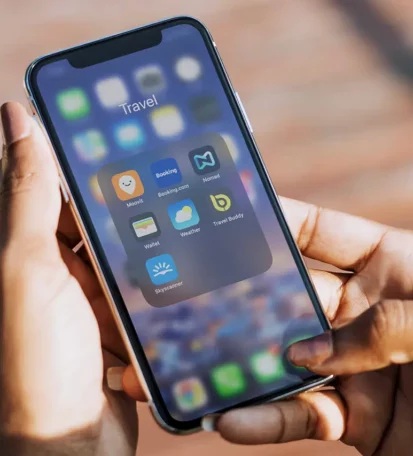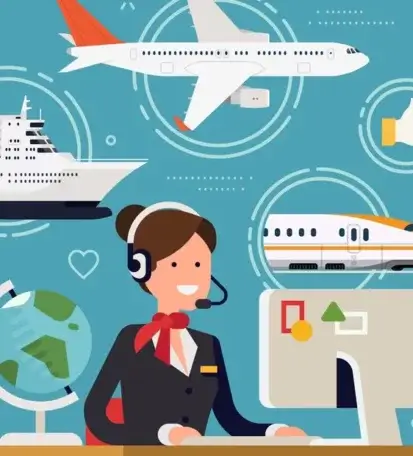Business Travel Guide
12 Untold Travel Arrangements Tips For Business Travellers

First and foremost, it’s crucial to research the destination thoroughly when making travel arrangements for a business trip. This includes understanding the local culture, customs, and laws, as well as any potential safety risks. It’s also important to consider the purpose of the trip and plan accordingly, such as scheduling meetings or site visits.
Once you have a clear understanding of the destination and purpose of the trip, you can start making travel arrangements. This includes booking flights, choosing the right accommodation, and planning your itinerary. It’s also important to consider packing essentials, staying connected abroad, and managing travel expenses.
Key Takeaways
- Thoroughly research the destination and purpose of the trip before making any travel arrangements.
- Book flights and accommodations that are convenient and cost-effective.
- Plan your itinerary, pack essentials, and stay connected while managing travel expenses.
1. Understand Corporate Travel Policies
When it comes to making travel arrangements for a business trip, it is important to understand the corporate travel policies of your company. These policies outline the guidelines and procedures for booking travel, managing expenses, and ensuring employee safety while on the road.
- Budget Guidelines
Corporate travel policies typically include budget guidelines that dictate how much can be spent on travel expenses. This may include limits on airfare, hotel accommodations, and ground transportation. It is important to understand these guidelines and stick to them to avoid overspending and potential issues with expense reporting.
- Preferred Travel Service Providers
Many companies have preferred travel providers that offer discounted rates and other benefits for business travel. These providers may include airlines, hotels, and car rental companies. It is important to check with your company’s travel department to determine which providers are preferred and to take advantage of any discounts or benefits they offer.
- Expense Reporting Procedures
Corporate travel policies also outline the procedures for reporting and reimbursing travel expenses. This may include requirements for itemized receipts, approval processes, and specific forms or software for submitting expenses. It is important to follow these procedures carefully to ensure timely reimbursement and avoid any potential issues with compliance.
2. Choose the Right Accommodation
When it comes to business travel, choosing the right accommodation is important for ensuring a comfortable and productive trip. Here are some factors to consider when selecting the perfect place to stay:
- Location Considerations
The location of the accommodation should be convenient for the purpose of the trip. For example, if the trip is for a conference or meeting, it is best to stay in a serviced apartment or hotel near the venue. If the purpose of the trip is to visit clients or customers, it is best to stay in a hotel close to their location.
- Amenities and Services
The amenities and services offered by the accommodation can greatly affect the comfort and productivity of the business trip. It is important to look for accommodations that offer amenities such as free Wi-Fi, business centres, meeting rooms, and fitness centres. Additionally, services such as laundry, dry cleaning, and room service can make the trip more convenient and efficient.
- Corporate Rates and Discounts
Many accommodations offer corporate rates and discounts for business travellers. It is important to research and compare rates to find the best deal. Additionally, it is worth considering loyalty programmes offered by hotels, as they can offer additional benefits and discounts.
Overall, choosing the right accommodation for a business trip can greatly impact the success of the trip. By considering location, amenities and services, and corporate rates and discounts, business travellers can find the perfect place to stay.
3. Booking Flights
When booking flights for a business trip, there are several factors to consider to ensure a smooth and cost-effective journey. Here are some tips to keep in mind when booking flights:
- Flight Comparison
It’s important to compare flights from different airlines to find the best deal. There are many online tools available that allow you to compare prices and flight times from different airlines. Some popular options include Skyscanner, Kayak, and Google Flights. By comparing flights, you can find the most cost-effective option that fits your schedule.
- Flexible Ticket Options
When booking flights for a business trip, it’s important to consider flexible ticket options. For example, when you book an open flight ticket. These tickets allow you to change your travel dates or times without incurring additional fees. This can be especially useful if you’re unsure about your travel plans or if unexpected changes arise. Many airlines offer flexible ticket options for an additional fee, so be sure to check with your airline before booking.
- Loyalty Programmes
Joining a loyalty programme can be a great way to save money on flights and earn rewards. Many airlines offer loyalty programmes that allow you to earn points or miles for every flight you take. These points can then be redeemed for free flights, upgrades, and other perks. If you frequently travel for business, joining a loyalty programme can be a great way to save money and make your travels more comfortable.
4. Plan Your Itinerary
When planning a business trip, creating an itinerary is crucial to ensure that everything runs smoothly. Here are some tips to help you plan your itinerary effectively.
- Meeting Schedules
One of the most important things to consider when planning your itinerary is the schedule of your meetings. It is essential to make sure that you have enough time to attend all your meetings and that there is enough time in between meetings to travel to the next location.
To help you keep track of your meeting schedule, you can create a table with the date, time, and location of each meeting. This will make it easier to plan your travel and ensure that you arrive at each meeting on time.
- Time Zone Management
When travelling to a different time zone, it is important to manage your time effectively. Jet lag can be a significant issue, and it can take several days to adjust to a new time zone fully.
To help manage your time effectively, you can create a schedule that allows you to adjust to the new time zone gradually. For example, you can try to go to bed and wake up at the same time each day, even if it means adjusting your schedule by a few hours.
- Local Transportation
When travelling to a new location, it is important to plan your local transportation in advance. This can include booking a rental car, using public transportation, or hiring a taxi or ride-sharing service.
To help you plan your local transportation, you can research the available options and create a list of the best options for your needs. You can also include information on the cost, travel time, and any other relevant details to help you make an informed decision.
5. Pack Travel Essentials
When it comes to packing for a business trip, it’s important to bring the essentials to ensure a successful trip. Here are some key items to pack for any business trip:
- Professional Attire
First and foremost, make sure to pack professional attire. This includes business suits, dress shirts and blouses, slacks and dress pants, skirts and dresses, and jackets and sweaters. Choose versatile pieces that can be mixed and matched to create multiple outfits.
- Travel Documents
Next, don’t forget to bring all the necessary travel documents. This includes your passport, visa (if required), ID, and any tickets or reservations. It’s also a good idea to keep a printed copy of your itinerary and hotel information in case of any unforeseen circumstances.
- Electronics and Connectivity
Lastly, ensure that you have all the necessary electronics and connectivity items. This includes your laptop, phone, chargers, and any necessary adapters. Don’t forget to also pack any necessary work-related items such as a notebook and pens.
To make packing easier, consider using packing cubes or a checklist to ensure you don’t forget anything important. By packing these essentials, you’ll be ready for any business trip that comes your way.
6. Stay Connected Abroad
- International Roaming
When making travel arrangements for business travel, it’s important to stay connected with colleagues, clients, and loved ones back home. One option is to activate international roaming on your mobile phone plan. This allows you to use your phone as you would at home, but with additional charges for calls, texts, and data usage. It’s important to check with your mobile provider before you travel to ensure that you have the correct plan for your needs and to avoid any unexpected charges.
- Wi-Fi Access
Another option for staying connected abroad is to use Wi-Fi. Many hotels, cafes, and airports offer free Wi-Fi access, but it’s important to be cautious when using public Wi-Fi networks. It’s recommended to use a virtual private network (VPN) to ensure that your internet activity is secure and private.
- Emergency Contacts
In case of an emergency, it’s important to have a list of emergency contacts with you at all times. This should include the contact information for your hotel, local emergency services, and any colleagues or clients that you may need to reach in case of an emergency. It’s also recommended to keep a copy of your passport and travel insurance information with you at all times.
Overall, there are several options for staying connected abroad, including international roaming and Wi-Fi access. It’s important to check with your mobile provider and to use caution when using public Wi-Fi networks. Additionally, having a list of emergency contacts and important documents with you at all times can provide peace of mind during your travels.
7. Stay Health and Safety
- Travel Insurance
One of the most important aspects of planning a business trip is ensuring that the traveller has adequate travel insurance. It is crucial to have travel insurance that covers medical expenses, personal liability, and loss or theft of personal belongings.
The traveller should check with their employer if they have a corporate travel insurance policy that covers them during their business trips. If not, they should purchase a personal travel insurance policy that meets their needs. The traveller should also ensure that they have a copy of their travel insurance policy with them at all times during their trip.
- Medical Precautions
Before travelling on a business trip, it is essential to take necessary medical precautions to ensure good health and avoid any medical emergencies. The traveller should consult with their doctor to discuss any pre-existing medical conditions and obtain any necessary medication or vaccinations.
It is also important to research the destination country’s health and medical facilities to know what to expect in case of a medical emergency. The traveller should carry a first aid kit with them, including any necessary medication, and ensure they have enough medication to last the duration of their trip.
- Safety Protocols
Safety should be a top priority when travelling on a business trip. The traveller should research the destination country’s safety protocols and familiarise themselves with the emergency contact numbers. They should also ensure that they have a copy of their passport and other important documents in case of loss or theft.
8. Manage Travel Expenses
When it comes to managing travel expenses for a business trip, it’s important to keep track of all the costs involved. This section will cover some tips on how to manage travel expenses effectively.
- Daily Allowances
One way to manage travel expenses is to provide employees with a daily allowance for meals and other expenses. This can help to keep costs under control and also make it easier for employees to manage their expenses. It’s important to set clear guidelines for what the daily allowance covers and to ensure that employees keep receipts for all expenses.
- Receipt Organisation
Keeping receipts organised is essential for managing travel expenses. It’s important to keep all receipts in one place and to make sure that they are easily accessible. One way to do this is to use a digital expense management system that allows employees to upload receipts and track expenses in real-time.
- Currency Exchange
When travelling abroad, it’s important to consider currency exchange rates. It’s a good idea to research the exchange rates before the trip and to make sure that employees have access to local currency. One option is to provide employees with a company credit card that can be used for expenses abroad. This can help to avoid the need for currency exchange and also make it easier to manage expenses.
9. Cultural Preparedness
When travelling for business, it is important to be culturally prepared to avoid any misunderstandings or offending the locals.
- Local Customs and Etiquette
Different cultures have different customs and etiquette, and it is important to do some research when making travel arrangements and before travelling to a foreign country. For example, in some cultures, it is considered rude to eat with your left hand, while in others, it is customary to remove your shoes before entering someone’s home or a place of worship. In some countries, it is also important to dress conservatively and avoid showing too much skin.
It is also important to be aware of the local business culture. In some countries, punctuality is highly valued, while in others, arriving a few minutes late is not considered a big deal. In some cultures, it is customary to exchange business cards, while in others, it is not necessary. Doing some research on the local business culture can help you make a good impression and avoid any misunderstandings.
- Language Barriers
Language barriers can be a challenge when travelling for business, especially if you are not fluent in the local language. It is a good idea to learn some basic phrases in the local language, such as “hello”, “thank you”, and “excuse me”. This can help you communicate with locals and show that you are making an effort to be respectful of their culture.
If you are travelling to a country where English is not widely spoken, it is a good idea to hire a translator or interpreter. This can help you navigate business meetings and negotiations more effectively. It is also important to be patient and understanding when communicating with locals who may not speak English fluently.
10. Leverage on Latest Technology
When it comes to making travel arrangements for a business trip, leveraging technology can make the process easier and more efficient. Here are a few ways to use technology to streamline your travel arrangements.
- Travel Apps
Travel apps can be a valuable tool for business travellers. These apps can help with everything from booking flights and hotels to finding local restaurants and attractions. Many travel apps also offer real-time updates on flight delays and cancellations, making it easier to adjust travel plans on the go.
Some popular travel apps include:
- TripIt: This app organises travel itineraries and sends real-time alerts and updates.
- Skyscanner: This app compares flight prices from different airlines and allows users to book directly through the app.
- Airbnb: This app allows users to book unique accommodations around the world.
Online Check-In
Online check-in is a convenient feature offered by many airlines. This allows passengers to check in for their flight and select their seats online, usually up to 24 hours before the flight. This can save time and reduce stress at the airport, as passengers can bypass long check-in lines and go straight to security.
- Electronic Boarding Passes
Electronic boarding passes are becoming increasingly popular among airlines. These allow passengers to store their boarding passes on their mobile devices, eliminating the need for a paper ticket. Electronic boarding passes can be accessed through a mobile app or email and can be scanned at security and at the gate.
Overall, leveraging technology can help business travellers save time and reduce stress when making travel arrangements. By using travel apps, online check-in, and electronic boarding passes, travellers can streamline their travel experience and focus on their business objectives.
11. Post-Trip Review
After a business trip, it is important to conduct a post-trip review to ensure that everything went smoothly and to identify areas for improvement. The post-trip review should include an expense reconciliation and feedback and improvements.
- Expense Reconciliation
The first step in the post-trip review is to reconcile the expenses incurred during the trip. This involves reviewing all receipts and invoices and comparing them to the budget that was set for the trip. Any discrepancies should be noted and investigated.
To make the expense reconciliation process easier, it is recommended to keep all receipts and invoices organized throughout the trip. This can be done by using a mobile app or by keeping a physical folder. It is also important to ensure that all expenses are recorded in a consistent and accurate manner.
- Feedback and Improvements
The second step in the post-trip review is to gather feedback from all parties involved in the trip, including the traveler, the travel manager, and any other stakeholders. This feedback should be used to identify areas for improvement and to make changes to the travel policy if necessary.
One way to gather feedback is to conduct a survey. The survey should include questions about the traveller’s experience, the booking process, the accommodations, and any other relevant topics. The results of the survey should be analysed and used to make improvements.
Another way to gather feedback is to hold a debriefing meeting with all parties involved in the trip. This meeting should include a discussion of what went well, what could have been improved, and any other relevant topics. The information gathered from the debriefing meeting should be used to make improvements to the travel policy and to ensure that future trips are more successful.
FAQs
What should be included on a checklist for business travel preparations?
A checklist for business travel preparations should include essential items such as travel documents, itineraries, appropriate clothing, technology equipment, chargers, and medications. It should also include a list of emergency contacts, travel insurance, and accommodation details.
How can a secretary effectively manage travel arrangements for executives?
A secretary can effectively manage travel arrangements for executives by creating a comprehensive travel plan, including travel dates, destination, transportation, and accommodation. They should also keep track of the executive’s itinerary and communicate any changes or delays.
What procedures are recommended for organising travel and accommodation for business?
When organizing travel and accommodation for business, it is recommended to start by researching the destination and identifying the best transportation and accommodation options. It is also important to consider the budget, travel policies, and preferences of the traveler.
How can one create a comprehensive itinerary for a business trip?
To create a comprehensive itinerary for a business trip, one should start by identifying the purpose of the trip and the locations to be visited. The itinerary should include travel dates, transportation details, accommodation information, and a schedule of meetings or events.
What are the essential steps in coordinating travel arrangements for a company?
The essential steps in coordinating travel arrangements for a company include researching destinations and travel options, creating a travel policy, communicating the policy to employees, and implementing a system for booking and managing travel.
What is the best way to communicate travel plans through email?
The best way to communicate travel plans through email is to provide a clear and concise summary of the itinerary, including travel dates, destination, transportation, accommodation, and any important meetings or events. It is also important to include any necessary travel documents and emergency contact information.




